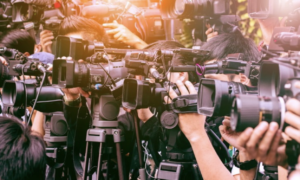How much can the Thai press express in this era?
Media . PoliticsEvery year on 3rd of May, it is celebrated as World Press Freedom Day. The theme this year is designated by UNESCO as “Freedom of expression as a driver for all other human rights”.

Data from the non-profit organization, Reporters Without Borders (Reporters Sans Frontières: RSF) released the World Press Freedom Index 2023, which surveys and ranks press freedom in 180 countries and territories around the world.

Norway has been in the first rank for the seventh year in a row with a score of 95.18, followed by Ireland, which rose from the sixth rank to the second rank, with a score of 89.91 ahead of Denmark which was ranked at 3rd position with 89.48 scores. An interesting observation is that the first places in the table are all European countries, especially the Scandinavian countries.
The three countries at the bottom of the list are Vietnam, ranking 178th. China fell 4 positions to 179th and North Korea at 180th.
Thailand was ranked at 106th position with a score of 55.24. Thailand’s ranking has increased from 2022 by 9 positions, which indicates a significant improvement in Thailand’s ranking over the past several years. But there is some noticeable data from this index. Looking back in 2004 during the period of “Thaksin Shinawatra” as prime minister, there was a survey that showed that Thailand’s press freedom was ranked at 59th position highest out of 167 countries and territories.
Although there is a certain level of freedom in presenting the news, some limitations prevent the media from doing their best. For instance, state power and capital power play an important role in Thai media, causing the media to censor themselves in order to survive and be safe.
It is undeniable that many times the state sees Thai media as “opponents” and leads to legislation that imposes a framework on the work of the media, as can be seen from the announcement Emergency decree about COVID-19 that makes the media dare not to criticize or examine the work of the state by applying the law Regulations. This reflects the government’s view that the media make it difficult for the state to work and cause unrest.

(Source: Thansettakij.com)
Looking at the world media situation, we will see that the press faces various threats. Likewise, the press in Thailand are often “blocked” from scrutinizing the work of government officials, being intimidated by authority figures, showing potentially dangerous behavior to the press, or being excluded from the area by a systematic process after the press just try to do their duty.
Thai media chose to present dramatic news because the presentation of in-depth reports makes the media threatened. Besides, the conditions of media organizations need to work fast and maintain ratings and views for income and survival.

(Source: Sanook.com)
Strengthening press freedom requires the cooperation of all sectors. However, the press must know how to resist and not follow the trend to create freedom in their own work.
“Press” and “freedom” are two things that must always go hand in hand since the essential duty of the press is to check and balance the power of the state. Therefore, it is necessary to have the freedom to perform these duties for the benefit of people in society.
Creating an environment in which the press can work freely is necessary to use the cooperation of “Media Ecology”, including government, media owners, media producers, mass media, and media consumers, allowing the media to maximize their performance with fearlessness. Thus, the press must present valuable and truthful information to the public, and this needs to be done together with educating the public about press freedom.
All sectors can call out and create freedom for the press. However, the most important thing is that the media must know how to stand up and fight for their rights and freedom in their work, also arming themselves to respect the rights and freedoms of the citizen so that the media can work effectively and based on true accuracy.